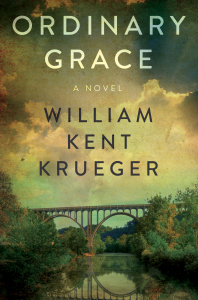
„She´s mad at Dad.“
„What did he do?“
„Nothing. But he´s God.“
„If you mention God to me one more time, I’ll leave you, I swear I will.“
Ariel is found dead with a cracked scull and – as it turns out – pregnant. Ordinary Grace is no longer just another coming of age novel. Tom and Huck are gone. Now it´s all about loss, grieve and trying to cope. „Loss, once it´s become a certainty, it is like a rock you hold in your hand. It has weight and dimension and texture. It´s solid and can be assessed and dealt with. You can use it to beat yourself or you can throw it away.“
Whereas Frank´s father Nathan seems to find faith, hope and love in God, Frank´s mother Ruth blames God and her husband for their misery. Ruth is suffering. „She was flesh without spirit, eyes without sight.“ Extraordinary and strong-minded Ruth who is a superb musician and singer, who likes to smoke and drink and hates cooking and ironing, is paralysed for a while and then turns her anger into action. She leaves her family.
The murder mystery will be solved easily. What still gets me hooked is the quite impressive lucidity of Ordinary Grace´s multilayered story which is far from being simple and does not seem to offer simple solutions.
Thomas Schirmer
–
Ariel is dead.
Frank found her floating in the river: „The day was hot and windless and the sky a china blue and I alone on the railroad bridge and cried my heart out above a river that seemed to have none.“
I only remember another book which moved me to tears too: Die Brueder Loewenherz, written by Astrid Lindgren. The book starts so fatal that I couldn’t keep reading it. Years later I tried again to read that sad story about the two brothers who are similar close as the two boys of the Drum family. One after the other died.
Jake: I´m afraid you´ll die, too.
Frank: I won´t ever die, I promise.
Jake: Everybody dies.
Frank: I won´t. I´ll be the first person who never died. And you´ll be the second.
Jake: I won´t mind dying. I just don´t want you to die.
The brothers talked about death just after Frank returned from church. Jake and Ruth had stayed at home. What a great idea of the author to let their father give a sermon about his quarrelling community using the words of the first letter to the Corinthians.:
„What´s left to us when that which we love most has been taken? I will tell you what’s left, three profound blessings. In his first letter to the Corinthians, Saint Paul tells us exactly what they are: faith, hope and love.“
Lajla Nizinski
–
OG
Oh, soz.
Soz, parallel readers. I’ve bailed. I skimmed to the end. Yuh huh …
Got fed up of Frankie’s interminable 60s-simulacrum world. Jello fucking Franco-American Spaghetti fucking Studebaker fucking soda fucking John F. Kennedy and Nikita Krushchev fucking nuclear war. Fucking blah.
But …
An association bled into my mind during chapter 3. The 1957 novel „There Is A Happy Land“ by Keith Waterhouse. Extravagantly, profoundly depressing, it tells the story (from first person viewpoint) of an 11 year old Leeds council estate kid over some months, starting during a summer in the late 1930s. In a way not unlike Catcher in the Rye, events are recounted from a point in the narrator’s life not too far on from the time when the story takes place. The memories are new, vivid and made all the more excruciating because the narrator hasn’t matured enough yet to see the story for what it is – for him it’s just a time in his life, some stuff that happened. Waterhouse’s novel makes Louis-Ferdinand Céline’s „Voyage au bout de la nuit“ look like melodrama by comparison. „There Is A Happy Land“ is a mediumistic classic, by the way. Read it. I’m grateful to William Kent Krueger for reminding me of its existence.
OG? Naw. Soz. Enjoyed some of what I read. Enjoyed not enjoying the rest. But Life’s too fuckin‘ short. The Bone Clocks now.
Soz.
Ian McCartney
